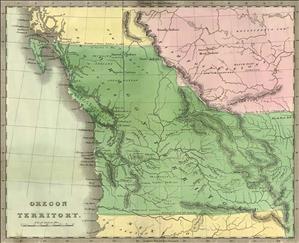European exploration of the Pacific Northwest from the late 1500s through the 1700s led to multiple and overlapping territorial claims by Spain, Russia, France, Britain, and last but not least, the new American republic. At issue was the vast "Oregon Country" extending along the Pacific Coast from the northern edge of Spanish California on the 42nd parallel to the southern edge of "Russian America" (now Alaska) at 54 degrees 40 minutes north.
How this area became known as "Oregon" is murky at best. Some have suggested that the word originated in the Mississippi Valley; others surmise that it stems from the French word for storm, ouragan, or the Spanish words oye agua, meaning "hear the water." Most historical accounts agree that English Army Major Robert Rogers first wrote the term "Ouragon" in an unsuccessful 1765 petition to explore the American West. American Captain Jonathan Carver used "Oregon" to refer to the fabled "River of the West" in his 1778 book, Travels Through the Interior Parts of North America.
In 1803, Thomas Jefferson referred to "Oregon" in his instructions to Meriwether Lewis for the Lewis and Clark expedition. The name gained wide exposure and an almost mythical aura when William Cullen Bryant used the name Oregon in his poem "Thanatopsis," published in 1817.
Spain had sent the first European expedition to the Pacific Northwest (the Juan Perez expedition in 1774) and in 1775 Spain (via the Hezeta and Bodega expedition) formally claimed the region. The American Revolution occurred from 1775 to 1783. Spain and England were traditional enemies and Spain took the side of the American colonies against England. Ultimately, after the revolution was won, the Americans inherited Spanish claims to the region.
Britain's claim to "New Albion" dated from the late 1700s, thanks in large part to Captain George Vancouver's expedition, and was reinforced by the traders and "factors" (agents) of the Hudson's Bay Company. The pendulum swung toward the American position after Captain Robert Gray crossed the Columbia bar on May 11, 1792, followed by the 1804-1806 Lewis and Clark expedition and the establishment of Fort Astoria in 1811.
When the War of 1812 was settled at Ghent on December 24, 1812, Britain and the U.S. agreed to form a joint commission to resolve boundary disputes. One result of that agreement was the Treaty of Joint Occupation of Oregon, signed on October 20, 1818. American and British citizens in Oregon then went about their business, mostly without incident. The joint occupancy treaty was renewed in 1827.
During this period of cohabitation, British and American citizen groups met often to discuss mutual needs and grievances. The most important of these civic gatherings were the "Wolf Meetings" at Champoeg on the lower Willamette River. On May 2, 1843, a vote of 52 to 50 favored a decision to organize into a civil community. On July 5th, this group adopted Oregon's first Organic Laws.
Americans streamed into the Oregon Country, and Great Britain's influence began to wane. Some extremists chanted "54-40 or Fight," demanding that U.S. territory extend north of the 54th parallel. Despite this pressure, in the Oregon Treaty of June 15, 1846, the United States agreed to the 49th parallel, which established national boundaries "westward of the Rocky Mountains."
Although the boundary issue appeared to be settled on land, disputes continued for nearly 30 years regarding which was the main channel of separation between American and British islands. The San Juan Islands boundary dispute was finally settled in 1872.
When Indians in what is now Eastern Washington killed settlers led by missionary Marcus Whitman in 1847, pressure increased on the federal government to provide protection and order in the region. Congress passed the "Act to Establish the Territorial Government of Oregon" on August 14, 1848.
Abraham Lincoln declined the territorial governorship and the job went to General Joseph Lane, fresh from the Mexican War. His hanging of five Indians accused in the "Whitman Massacre" signaled that law (if not justice) was finally being imposed in "Oregon Country."
In 1853, Washington Territory split off from Oregon. Oregon and Washington were admitted to the union and became states in 1859 and 1889 respectively.

